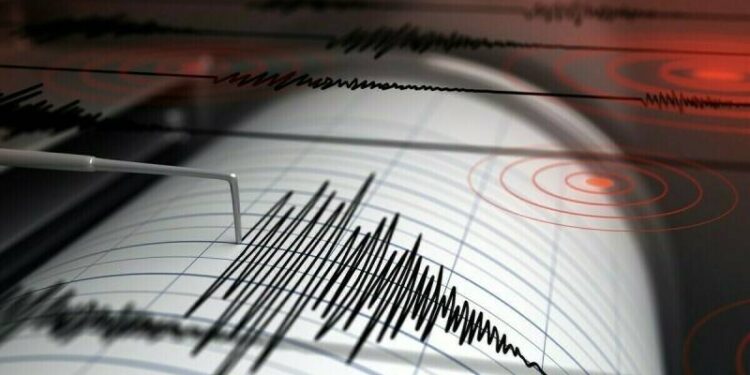A 5.5-magnitude earthquake shook parts of Punjab and KP in Pakistan on April 12, 2025. No damage was reported, but safety remains vital.
5.5-Magnitude Earthquake:
On Saturday, April 12, 2025, a 5.5-magnitude earthquake shook several regions of Pakistan, frightening many residents. Particularly in places like Attock, Chakwal, Mianwali, Peshawar, Mardan, Mohmand, and Shabqadar, people in Punjab and Khyber Pakhtunkhwa felt the earthquakes. Although there were fortunately no reports of significant damage or fatalities, the quake served as a reminder to everyone of the dangers that Pakistan confronts from natural disasters.
Earthquake Happened:
Local time, the earthquake occurred at 12:31 PM. About 60 kilometers northwest of Rawalpindi was the epicentre, according to the National Seismic Monitoring Centre (NSMC). The quake occurred 12 kilometers below the surface, which is regarded as a shallow depth and frequently causes more intense surface shaking.
Suddenly, people in many cities felt the ground move. Many people hurried from their houses, workplaces, schools, and other structures. When the earthquake occurred, some people were enjoying the weekend, while others were working or praying.
Regions Affected by the Earthquake:
Punjab:
In the Punjab province, areas like Attock, Chakwal, and Mianwali experienced clear shaking. People in homes and workplaces quickly went outside. Thankfully, there was no panic or stampede, and most citizens acted calmly and followed safety instructions.
Khyber Pakhtunkhwa (KP):
Cities in KP such as Peshawar, Mardan, Mohmand, and Shabqadar also felt the tremors. Many people reported feeling the earthquake for several seconds. As in Punjab, people moved to open spaces and waited until it was safe to go back indoors.
The Provincial Disaster Management Authority (PDMA) in Punjab and Khyber Pakhtunkhwa was quick to respond. They reported that no casualties or major damage occurred in any of the affected areas. However, emergency teams were kept on high alert. Control rooms remained open to monitor aftershocks and ensure quick help if needed.
The NSMC continued to observe the situation closely and kept the public informed through official channels.
Earthquakes in Pakistan:
Pakistan is located on the border between the Indian Plate and the Eurasian Plate, two major tectonic plates, making it an earthquake-prone area. Because of this, the nation is susceptible to earthquakes.
On October 8, 2005, a 7.6-magnitude earthquake that devastated northern Pakistan and parts of Kashmir was one of the deadliest in Pakistani history. It wrecked entire cities and villages and killed almost 74,000 people. As a warning of how dangerous earthquakes may be, that terrible incident is still remembered today.
While the April 12, 2025, earthquake did not cause damage or loss of life, it serves as a wake-up call. Earthquakes can happen anytime, so it is important to always be ready. Here are some key steps everyone should take to stay safe:
Stay Informed:
Always follow updates from official sources like the NSMC, PDMA, and local authorities. Reliable news channels and mobile apps can also help provide quick alerts during emergencies.
Prepare an emergency kit:
An emergency kit should be kept in every home. It should include:
- Drinking water
- Dry food or snacks
- A flashlight
- Extra batteries
- A basic first-aid kit
- Important documents in a waterproof bag
- Emergency contact numbers
Having these items ready can save lives during or after an earthquake.
During an Earthquake:
Teach your family what to do if an earthquake strikes. The three most important actions are:
- Drop to the ground
- Cover your head and neck under a sturdy table or furniture.
- Hold on until the shaking stops.
If you are outside, move away from buildings, trees, and electric poles. If you are in a car, stop in a safe place away from traffic and large structures.
Check the structural safety of buildings:
Make sure your home or building is made to resist earthquakes. This is especially important in older buildings. If needed, hire professionals to inspect your home and suggest improvements. In new constructions, follow government safety guidelines and use earthquake-resistant materials.
Participate in safety drills
Schools, offices, and communities should regularly organize earthquake safety drills. These drills help people react calmly and correctly in case of a real emergency. Children, especially, should be taught how to protect themselves.
Government’s Role in Earthquake Safety:
While individuals must take steps to stay safe, the government also has a big responsibility. Authorities should:
- Ensure building codes are followed
- Monitor seismic activity constantly.
- Educate the public through awareness campaigns.
- Train emergency response teams.
- Improve early warning systems.
By working together, the public and the government can reduce the risks and damage caused by earthquakes.
How Media Helped:
TV channels, newspapers, and social media platforms played an important role in sharing information quickly. People were updated about the location, time, and impact of the earthquake within minutes. Accurate news helped reduce panic and guided people on safety measures. However, it is also important to avoid fake news or rumours, which can create fear. Always confirm news from trusted sources.
What Happens After an Earthquake?
Even after the main earthquake, smaller tremors called aftershocks can happen. These can also cause damage, especially if buildings are already weakened. Aftershocks may continue for days or even weeks. Therefore, after an earthquake:
- Check your home for cracks or other signs of damage.
- Avoid using damaged electrical lines or gas supplies.
- Help neighbours, especially the elderly or disabled
- Stay updated about aftershocks through official channels
Conclusion:
The April 12, 2025, 5.5-magnitude earthquake serves as a reminder of the unpredictability of natural calamities. Fortunately, there was no damage or fatalities this time. However, we must treat this incident seriously and keep getting ready for crises in the future.
Being ready benefits not just you but also your friends, family, and community. We can remain secure even during trying circumstances if we have the correct information, resources, and teamwork. Instead of being a tragedy, let this earthquake serve as a warning. Keep yourself informed, prepared, and safe.






















